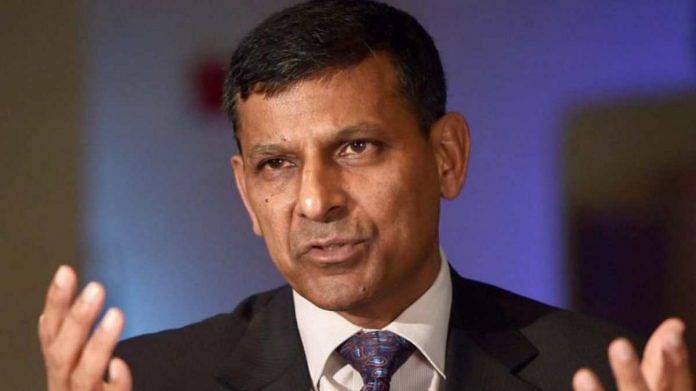New Delhi: The rupee is stronger than what would be ideal to maintain India’s export competitiveness, former Reserve Bank of India (RBI) governor Raghuram Rajan said Friday, pushing for gradual depreciation of the currency.
In a discussion with HDFC Chairman Deepak Parekh at the ASCENT eConclave 2020, Rajan said India needs to worry about its medium-term growth trajectory and see if the current levels of demand are sustainable in the future, pointing out there is a section of the population such as those working in hotels and restaurants that are yet to see a return of their livelihoods.
“With all the flows that are coming in, the rupee is probably stronger than what one would want from an exports perspective. If you look at Brazil, the currency has depreciated by 30 per cent. We don’t want that kind of depreciation, but we don’t want a rupee that is too strong in real terms. Some depreciation over time would be good to maintain our external competitiveness. One way to do it to let more money go out,” he said.
The Indian rupee has been trading at around Rs 73-74 to a dollar.
Also read: Indian households remain under duress with income still below pre-Covid levels — study
Judicious spending can elevate growth
Talking about India’s economic recovery, Rajan welcomed signs of revival, but warned that one needs to see if demand will be sustainable after the current bout of pent-up demand and after the incentives provided by the government end.
“I would be cautious on the medium-term trajectory of the economy… They are people with buying power. They are expressing themselves. That is good. But what about those who don’t… we have to be careful,” he said.
Rajan also flagged the Covid-19 pandemic as a significant risk to the growth recovery. He further pointed out that the debt burden piling up in small and medium firms as well as households is a cause of worry and said their ability to repay once the forbearance ends will need to be closely watched.
Rajan favoured a “little more judicious spending on the right things” and pointed out that this could elevate India’s rate of growth.
Parekh was of the view that India needs a stimulus but stressed the need to be careful on fiscal spending. He also advocated setting up a sovereign wealth fund, pointing out this will help create wealth for our future generations.
No will for privatisation
Rajan also lamented the lack of will shown by the government to privatise state-owned firms. He questioned why India is not selling shares of state-owned firms even when the markets are trading at record highs.
“We will never privatise unless there is a will and the will has to come from the top,” he said, adding it might be better to sell shares of a firm to the larger public rather than to one large entity.
“Often, with well managed entities, selling shares to the public makes much more sense than selling it to one entity,” Rajan added.
Indian corporates more pessimistic than before
Rajan also said Indian corporates are more pessimistic than before. He pointed out how in the early 2000s, Indian businesses were optimistic, but are now pessimistic. He cited how businesses are now talking about Chinese crowding Indian firms out.
“I think that an optimistic Indian businessman can do far more than the pessimistic Indian businessman. They should ask the government not for tariffs and sops, but for a better infrastructure and a cleaner business environment,” he said.
Also read: Economic recovery stronger than expected, but surge in Covid cases key risk — RBI governor




Hi.keeping.the.rupee.1000.week.only.impoverishesh.and.indian.take.acue.with.strong.notes.who.can.buy.up.resources.of.country.this.week.
He is a great academic and is best in western world… but fails to understand the microcosm of Indian economy. With more than half the economy is informal, it is difficult to predict Indian economy mire accurately. I don’t know why is giving advice when the current government does feel the need. If rupee is strong.. so be it.. our imports would be cheaper. We keep talking of export which is 15% of the economy and lower than domestic economy where imports have significant role. I hope western powers are not influencing anyone to destabilise India
RRR is a D graded and dumped waste
Comments also waste of time on his views
Failed economist, most of the $150 billion NPA (bank loans) were issues to crony capitalists, under his governorship of
India’s federal bank (Reserve Bank of India). Modi brought stricter laws including giving power to leaders to liquidate companies owing money. A simple law corner stone of credit in capitalism was non existent in India and he did bother recommend such legislation during his years under congress.
A strong Ruppe is no good for anyone. I wonder how its able to maintain the current levels? Didn’t hear anything of stabilizing the currency from RBI. Then how?
Keeping the rupee weak only impoverishes and enslaves Indians. Take a cue from countries with strong currencies who can easily buy up the resources (including human resources) of countries with weak currencies.